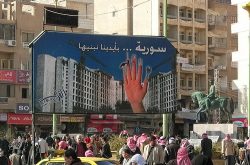Al Jazeera English is campaigning for greater access to the US market, building on positive publicity about its coverage of the Egyptian revolution. But research by William Youmans and Katie Brown suggests that substantial prejudice against AJE persists among segments of the American public, even after they are exposed to its coverage.
Read More »Digital Protectionism: Preparing for the coming Internet Embargo
Rami Khater sees the first signs that the United States and its allies might use their dominance of the Internet as a weapon against their enemies in the Middle East and argues that countries in the region would do well to develop indigenous Internet platforms.
Read More »Privileging the Private: Media and Development in Syria
Leah Caldwell examines coverage of 'development' by the privately owned Syrian daily al-Watan and finds that it is always discussed in a tightly controlled framework where a handful of participants are allowed to participate and determine exactly what or who needs to be developed.
Read More »Saintly Soap Operas: An examination of three Coptic saint dramas
Omar Foda looks at the video hagiographies of three Coptic saints and finds that this little-studied genre draws heavily on the tropes of the Egyptian musalsal, including very colloquial Arabic language and exclusive use of melodrama in the presentation of emotions
Read More »The Unlikely Young Cosmopolitans of Cairo
Heba Elsayed argues that young members of Cairo's lower middle classes, because of their ability to negotiate for themselves a heterogeneous cosmopolitanism dependent upon local repertoires yet also drawing on global discourses, are more deserving of the cosmopolitan label than their upper-class counterparts.
Read More »Digital Shahid – From Broadcast Media to Citizen Journalism in Palestine
Gianluca Iazzolina traces developments in Palestinian media from the partisan-dominated 1990s to the more diverse forms of the 21st century. He concludes that information technologies are helping to bridge the gap between Israeli and Palestinian civil societies, allowing them to mirror each other in their most human dimension.
Read More »Cloud Computing and the Monolithic Narrativer
Rami Khater discusses the implications of automated translation based on cloud computing and warns that the subaltern’s narrative and voice could be removed from the interpretation of all human history if our collective knowledge passes through the filters of these trained algorithms.
Read More »Syrian Dabke Meets Western Media
Leah Caldwell examines Western coverage of the Syrian music and art scene, focusing on the case of dabke musician Omar Souleyman, and says some of the coverage perpetuates the idea that without a Western seal of authenticity on a particular art form, its cultural value is significantly diminished.
Read More »Catch & Release: Evaluating the Free Kareem Campaignr
Courtney C. Radsch argues on the basis of the Kareem Amer case that although cyberactivists and rights organizations are capable of sustained campaigns in defense of freedom of expression, some governments at least are almost impervious to the pressure, even at the cost of significant damage to their international image.
Read More »News Consumption among Young Libyan Adults
Mokhtar Elareshi and Barrie Gunter present the findings of a survey on the television news viewing habits of Libyan students. The survey confirms that pan-Arab television stations are their favorite choice, displacing the local alternatives.
Read More » Arab Media & Society The Arab Media Hub
Arab Media & Society The Arab Media Hub









